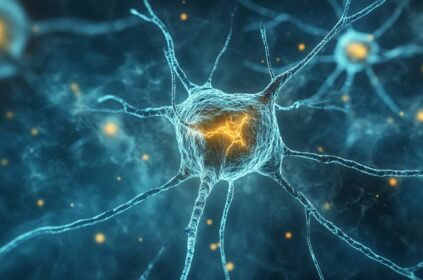As the American population ages, addressing the complexities of cognitive decline becomes increasingly vital. Amidst this growing concern, delta-9 tetrahydrocannabinol (Δ9-THC), the principal psychoactive compound found in cannabis, has emerged as a focal point of research. This compound not only interacts with the body’s endocannabinoid system but may also play a significant role in promoting neuroplasticity—our brain’s remarkable ability to adapt and reorganize in response to new experiences or injury. In this article, we’ll explore what Δ9-THC is, how it affects neuroplasticity in aging brains, and the implications of its use.
Understanding Delta-9 THC and Neuroplasticity
Delta-9 THC is well-known for its euphoric effects, but its nuances extend beyond simple recreational use. When Δ9-THC enters the body, it binds to cannabinoid receptors in the brain, which are integral to regulating diverse physiological processes. This interaction opens the door to a variety of cognitive effects, sparking interest in its potential benefits, especially as our cognitive faculties begin to diminish with age.
The Concept of Neuroplasticity
Neuroplasticity might sound like a complex term, yet it simply refers to the brain’s ability to create and strengthen new neural pathways—essentially how it learns and remembers. This adaptability is crucial for maintaining cognitive health. However, as we grow older, neuroplasticity often declines. This decline can manifest as memory loss, difficulties in decision-making, or diminished learning capabilities.
Cognitive Benefits of Δ9-THC in Aging Brains
While the research is still in its infancy, promising findings suggest Δ9-THC may offer cognitive benefits, particularly for aging brains.
Enhanced Working Memory
In various studies, Δ9-THC has shown the potential to enhance working memory in older subjects. Notably, research involving aged rats demonstrated that regular consumption of low doses of Δ9-THC led to improved performance in tasks reliant on the prefrontal cortex, a region closely associated with executive functions.
Anti-Aging Effects on the Brain
Interestingly, long-term, low-dose treatment with Δ9-THC has been associated with anti-aging effects. Research on aged mice indicates that this treatment not only restored cognitive abilities but also increased synaptic densities. These enhancements are partly due to heightened energy production within the brain, leading to what might be considered a rejuvenating effect on the cognitive landscape.
Reversal of Age-Related Cognitive Decline
Another exciting avenue of research suggests that Δ9-THC at microdoses can reverse cognitive decline linked to aging. In studies where mice were administered Δ9-THC, researchers noted significant enhancements in adult neurogenesis—essentially the brain’s capacity to produce new neurons—and the inhibition of neuroinflammation, a common issue in aging brains. These biological changes reflect concrete alterations in brain morphology that led to denser tissue in various regions critical for memory and learning.
Mechanisms Underlying the Effects of Δ9-THC
To appreciate how Δ9-THC affects the aging brain, it’s essential to delve into the mechanisms involved.
Gene Expression and Neurogenesis
One of the striking aspects of Δ9-THC treatment is how it alters gene expression patterns within the brain. Specifically, it appears to upregulate genes associated with neurogenesis, one of the most notable being Igf2, known for its neuroprotective qualities. The implications are clear: enhancing the brain’s ability to regenerate can potentially counteract some cognitive decline associated with aging.
mTOR Activity and Metabolic Changes
A fascinating finding is the relationship between Δ9-THC and mTOR (mechanistic target of rapamycin) activity. mTOR is a critical regulator of cell growth and metabolism, influencing cognitive performance. The rise in mTOR activity within the brain combined with the decrease in peripheral tissues suggests a dual mechanism by which Δ9-THC promotes cognitive enhancement while possibly reducing metabolic overload elsewhere in the body.
Neuroprotective Properties
Another vital aspect of Δ9-THC is its neuroprotective properties. The treatment appears to stimulate the production of beneficial enzymes and proteins, like Sirtuin 1, which is celebrated for its anti-inflammatory effects and neuroprotection. This protective layer could be the key to maintaining cognitive health as we age.
Age-Dependent Effects of Δ9-THC
It’s critical to note that the effects of Δ9-THC vary significantly with age. While the compound shows promise for enhancing cognitive functions in older adults, it may have the opposite effect in younger individuals, sometimes causing memory disruptions and destabilizing synaptic connections.
Clinical and Practical Implications
As research continues to unfold, the potential therapeutic applications of Δ9-THC present intriguing prospects.
Potential Therapeutic Applications
Long-term use of low-dose Δ9-THC presents a potential pathway for addressing cognitive decline in the elderly. The unique properties of Δ9-THC suggest that, instead of being viewed solely as a recreational substance, it could pave the way for the development of new medications aimed at enhancing cognitive health and counteracting the effects of aging.
Considerations for Use in Older Adults
While the benefits may be substantial, careful consideration is essential when administering Δ9-THC to older adults. Chronic use, especially of high-THC inhaled cannabis, can carry risks, including anxiety and possible cognitive impairments if not closely monitored. It’s paramount to weigh the potential benefits against these risks, keeping in mind individual health profiles and existing conditions.
Conclusion
The exploration of Δ9-THC and its impacts on neuroplasticity in aging brains offers both promise and curiosity. The potential to enhance cognitive functions and provide anti-aging effects represents a significant opportunity for improving the quality of life for elderly individuals. As we strive to understand the delicate balance between benefits and risks, continued research will help us unlock the full potential of Δ9-THC in addressing age-related cognitive challenges.
Actionable Tips and Next Steps
- Consult Healthcare Professionals: Always speak with healthcare professionals before starting any cannabis-derived regimen, especially for cognitive health concerns.
- Stay Informed: Engage with credible sources and medical literature to remain abreast of the latest findings related to Δ9-THC and cognitive function.
- Support Research: Advocate for further studies into the therapeutic uses of Δ9-THC and related compounds to ensure that future developments are backed by robust scientific evidence.
As you consider how hemp products can fit into your life or the lives of those around you, keep the evolving research on Δ9-THC in mind. The journey of understanding continues, and as new insights emerge, so too will our capacity to address aging and cognitive health.





















